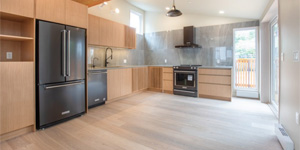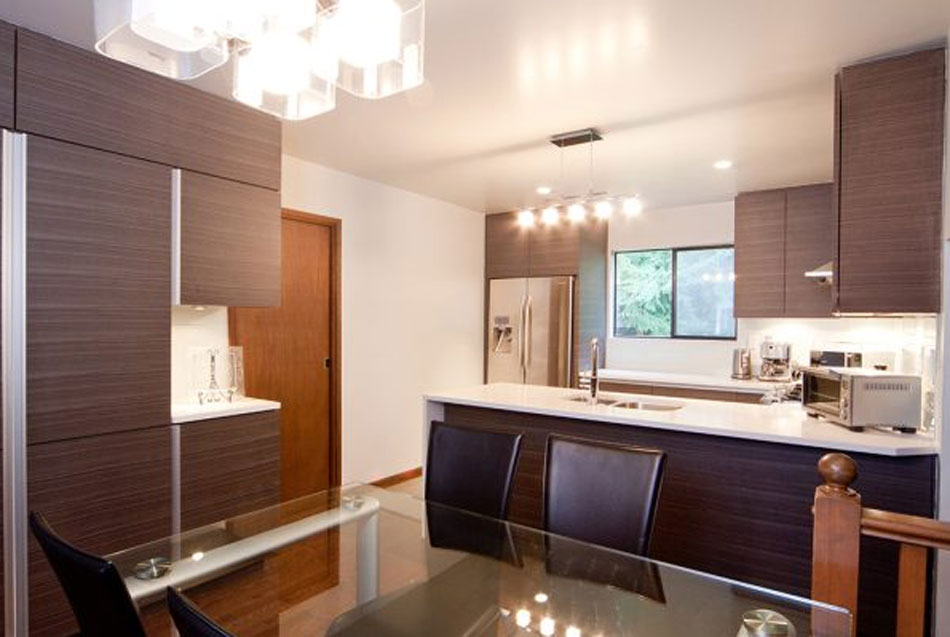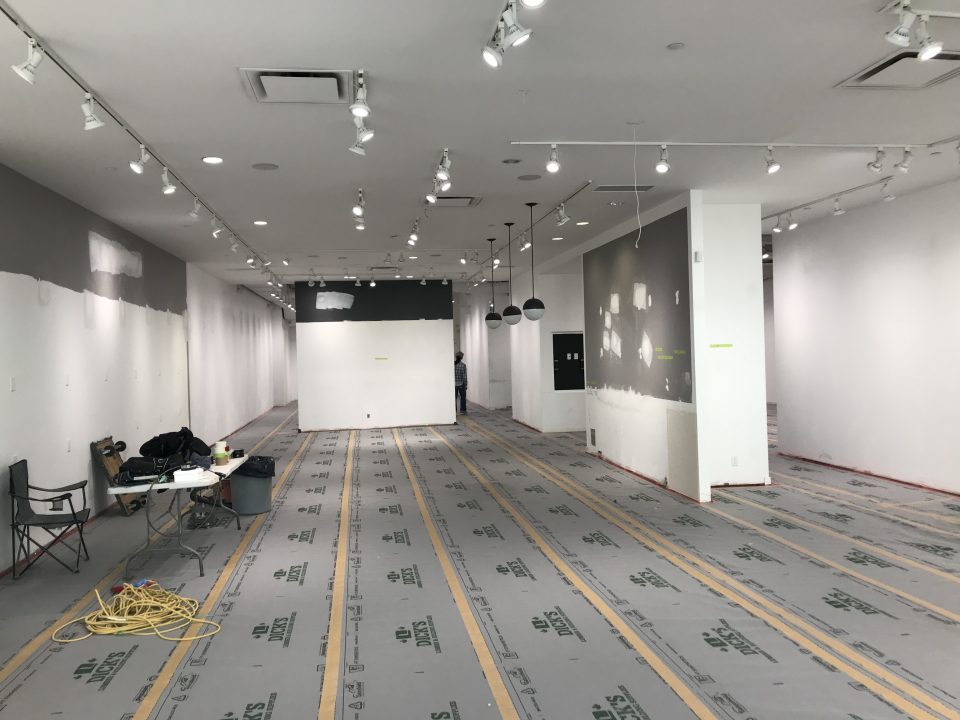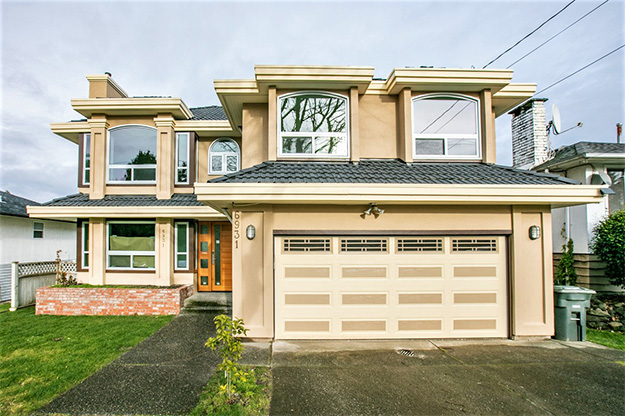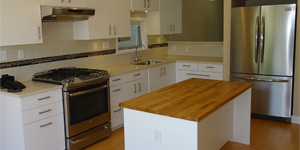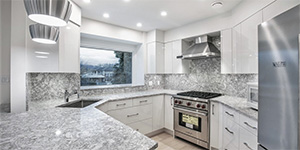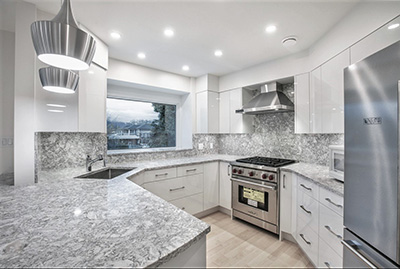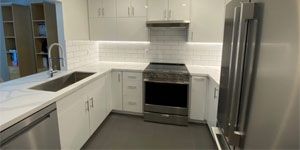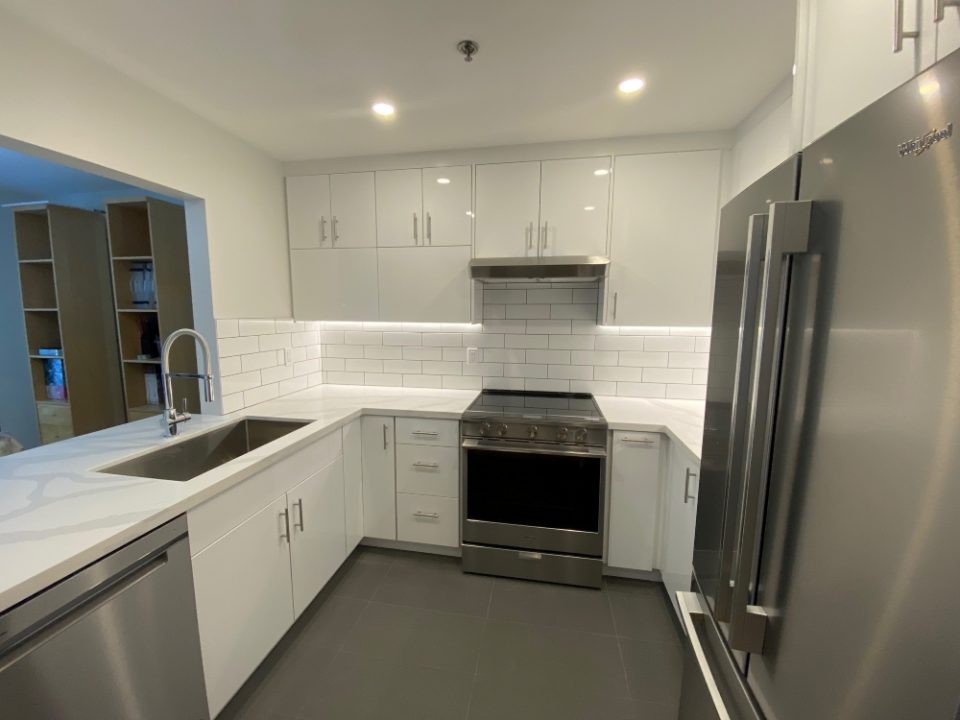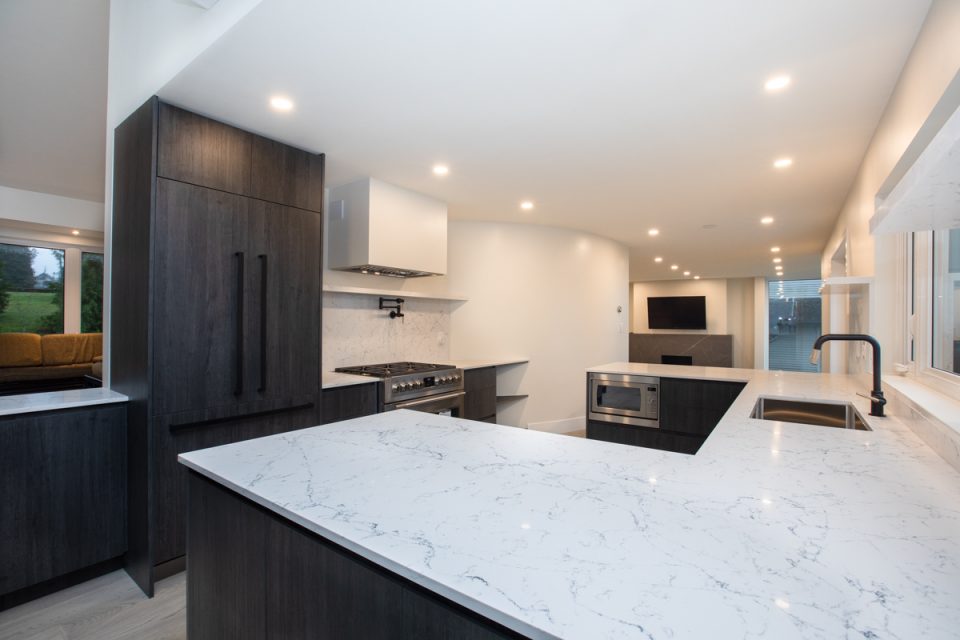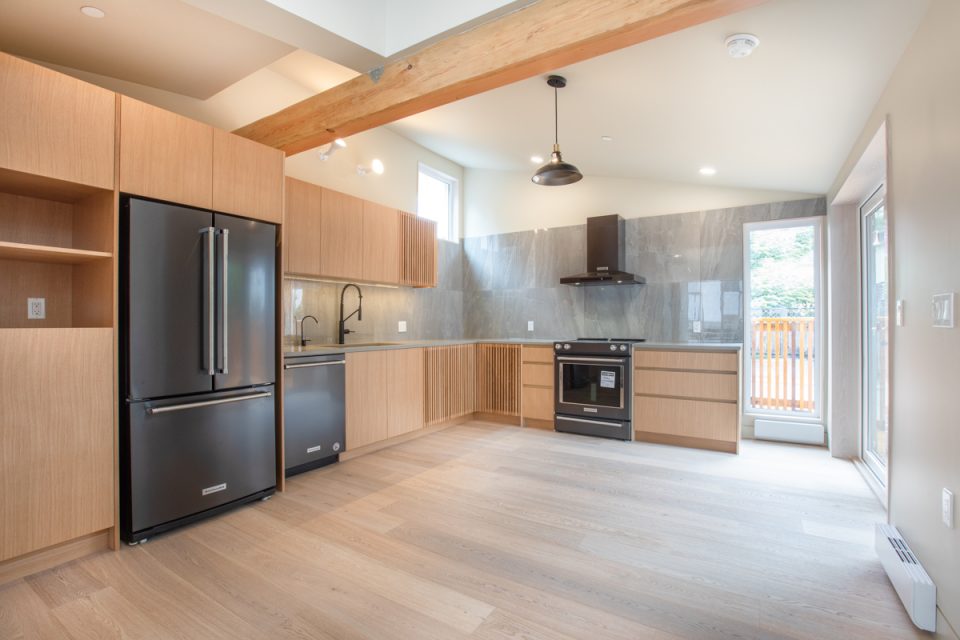
Planning a kitchen renovation in Vancouver? You’re making one of the smartest investments in your home. A well-executed kitchen remodel not only transforms your daily living experience but can recoup 75-90% of its cost when you sell your property. However, understanding the true costs involved is essential for creating a realistic budget and avoiding expensive surprises.
As Vancouver’s trusted renovation experts since 1995, Canadoo Enterprises has guided hundreds of homeowners through successful kitchen transformations. This comprehensive guide breaks down everything you need to know about kitchen renovation costs in Vancouver for 2026.
Quick Overview: What to Expect
Kitchen renovation costs in Vancouver vary significantly based on project scope, materials, and your home’s specific needs. Here’s what you can expect:
- Budget-Friendly Refresh: $20,000 – $35,000
- Mid-Range Renovation: $50,000 – $85,000
- High-End Transformation: $75,000 – $150,000+
The average kitchen renovation in Vancouver currently sits around $55,000 to $70,000, though your specific project cost will depend on numerous factors we’ll explore below.
Breaking Down Kitchen Renovation Costs by Project Type
Budget-Friendly Kitchen Refresh ($20,000 – $35,000)
Perfect for homeowners looking to update their kitchen’s appearance without major structural changes, this level includes:
What’s Included:
- Cabinet refacing or painting (existing layout maintained)
- New countertops (laminate or entry-level quartz)
- Updated lighting fixtures
- Fresh paint and backsplash
- New hardware and faucets
- Minor plumbing fixture updates
Best For: Condos, rental properties, or homes preparing for sale where a fresh look matters most.
Timeline: 3-4 weeks
Permit Requirements: Generally none required for cosmetic-only updates
Mid-Range Kitchen Renovation ($50,000 – $85,000)
This is Vancouver’s most popular renovation tier, offering substantial improvements while maintaining budget consciousness:
What’s Included:
- Semi-custom or stock cabinetry with quality construction
- Quartz or granite countertops
- Mid-range stainless steel appliances
- New flooring (engineered hardwood or quality vinyl)
- Updated electrical and plumbing
- Recessed lighting and under-cabinet lighting
- Tile or glass backsplash
- New sink and fixtures
Best For: Family homes where functionality and durability matter alongside aesthetics.
Timeline: 8-12 weeks
Permit Requirements: Required if moving plumbing, electrical work, or structural changes
High-End Kitchen Transformation ($75,000 – $150,000+)
For homeowners seeking a luxury kitchen with custom features and premium materials:
What’s Included:
- Fully custom cabinetry with specialized storage solutions
- Premium countertops (high-end quartz, marble, or exotic granite)
- Professional-grade appliances
- Hardwood or premium tile flooring
- Complete electrical system upgrade
- Custom lighting design with dimmer controls
- Designer backsplash with premium tile or stone
- Layout modifications and structural changes
- Built-in features (wine refrigerator, warming drawers, etc.)
Best For: Luxury homes, serious home cooks, or properties in high-value Vancouver neighborhoods like West Vancouver, Kitsilano, or Point Grey.
Timeline: 12-20 weeks
Permit Requirements: Almost always required due to structural, electrical, and plumbing work
Cost Breakdown by Square Footage
Vancouver kitchen renovations typically cost between $130 and $350 per square foot, depending on finish quality:
- 100 sq ft kitchen (typical condo): $13,000 – $35,000
- 150 sq ft kitchen (townhouse average): $19,500 – $52,500
- 200 sq ft kitchen (single-family home): $26,000 – $70,000
- 250 sq ft+ kitchen (larger homes): $32,500 – $87,500+
These ranges account for materials, labor, and basic permit costs but may not include structural changes or high-end custom features.
Detailed Cost Breakdown by Component
Understanding individual component costs helps you make informed decisions about where to invest your budget:
Cabinetry ($9,500 – $26,500)
Cabinets typically consume 30-40% of your total kitchen budget and have the biggest visual impact:
- Stock cabinets (IKEA or similar): $3,000 – $8,000
- Semi-custom cabinets: $12,000 – $20,000
- Fully custom cabinets: $18,000 – $30,000+
Canadoo Tip: Quality cabinetry is worth the investment. We recommend focusing budget here rather than on trendy backsplash or hardware that’s easier to update later.
Countertops ($3,000 – $12,000)
Your choice of countertop material significantly impacts both cost and functionality:
- Laminate: $1,500 – $3,500 (30-40 per sq ft installed)
- Quartz: $4,500 – $9,000 ($90 – $170 per sq ft)
- Granite: $4,000 – $8,500 ($80 – $150 per sq ft)
- Marble: $6,000 – $12,000+ ($120 – $200 per sq ft)
Vancouver Climate Consideration: Quartz is our top recommendation for Vancouver kitchens. It’s durable, non-porous, low-maintenance, and handles our humid climate better than natural stone.
Appliances ($2,000 – $15,000+)
Appliance costs vary dramatically based on brand and features:
- Budget package (basic brands): $2,000 – $4,000
- Mid-range package (quality brands): $5,000 – $10,000
- High-end package (premium/professional brands): $12,000 – $25,000+
A typical mid-range appliance package includes a refrigerator ($1,500-$3,000), range/cooktop ($800-$2,500), dishwasher ($600-$1,200), and range hood ($400-$1,500).
Flooring ($2,000 – $8,000)
Kitchen flooring must withstand heavy traffic and moisture:
- Vinyl plank: $2,000 – $4,000
- Ceramic or porcelain tile: $3,000 – $6,000
- Engineered hardwood: $4,000 – $7,000
- Solid hardwood: $5,000 – $9,000+
Pro Tip: For Vancouver’s climate, we often recommend porcelain tile or engineered hardwood over solid hardwood, as they handle moisture fluctuations better.
Labor Costs ($15,000 – $45,000)
Professional labor ensures code compliance and quality workmanship:
- Demolition: $1,000 – $3,000
- Plumbing: $2,000 – $6,000
- Electrical: $2,500 – $7,000
- Cabinetry installation: $2,000 – $5,000
- Countertop installation: $500 – $2,000
- Tile/backsplash installation: $1,500 – $4,000
- Project management and coordination: $3,000 – $8,000
Vancouver’s active housing market means labor rates average $80-$160 per hour, higher than many Canadian cities.
Lighting ($1,200 – $4,200)
Modern kitchen lighting includes multiple layers:
- Recessed pot lights: $150 – $400 per fixture installed
- Pendant lights: $200 – $1,500+ each
- Under-cabinet lighting: $500 – $2,000
- Electrical panel upgrade (if needed): $2,000 – $4,000
Backsplash ($1,500 – $6,000)
Backsplash costs depend on material choice and installation complexity:
- Ceramic tile: $25 – $45 per sq ft installed
- Glass tile: $35 – $65 per sq ft installed
- Natural stone: $40 – $80 per sq ft installed
- Custom mosaic or designer tile: $60 – $150+ per sq ft installed
Vancouver-Specific Cost Factors
Several unique factors affect kitchen renovation costs in our city:
Permits and Inspections ($500 – $3,000)
The City of Vancouver requires permits for most kitchen renovations involving:
- Moving or removing walls
- Relocating sinks, stoves, or dishwashers
- Electrical upgrades or panel replacements
- Gas line modifications
- Any structural changes
Basic kitchen renovation permits start around $500-$800, while comprehensive renovations requiring structural, electrical, and plumbing permits can reach $2,000-$3,000.
Energy Efficiency Requirements: For renovations valued over $20,000, Vancouver requires an EnerGuide evaluation and energy upgrade proposal, adding $500-$1,500 to your costs.
Condo and Strata Considerations ($300 – $1,500)
Vancouver’s high density means many kitchen renovations occur in condos:
- Strata approval fees: $300 – $800
- Strata application preparation: $200 – $500
- Engineering reports (if required): $500 – $2,000
- Parking permits for contractors: $200 – $600
Disposal and Waste Management ($1,000 – $3,000)
Vancouver’s strict waste disposal regulations impact costs:
- Bin rental: $400 – $800
- Disposal fees: $600 – $1,500
- Recycling and material separation: $200 – $700
Unexpected Issues in Older Homes ($2,000 – $20,000)
Vancouver’s heritage and character homes often reveal surprises:
- Asbestos removal: $3,000 – $15,000
- Mold remediation: $2,000 – $12,000
- Electrical panel upgrades: $2,500 – $5,000
- Plumbing system updates: $3,000 – $8,000
- Structural repairs: $5,000 – $20,000+
Canadoo Recommendation: Budget 15-20% contingency for unexpected issues, especially in homes built before 1980.
Neighborhood Cost Variations
Kitchen renovation costs can vary by Vancouver neighborhood:
West Vancouver: $200 – $350 per sq ft (highest due to luxury expectations)
Kitsilano, Point Grey, Kerrisdale: $150 – $280 per sq ft (upper-mid to high-end)
Mount Pleasant, Commercial Drive: $130 – $220 per sq ft (mid-range)
Burnaby, New Westminster: $120 – $200 per sq ft (slightly lower than Vancouver core)
Condo kitchens (Downtown, Yaletown): $140 – $250 per sq ft (space constraints increase per-square-foot costs)
Money-Saving Strategies Without Sacrificing Quality
1. Maintain Your Existing Layout
Moving plumbing and electrical adds $5,000-$15,000 to your budget. If your current layout works reasonably well, keeping appliances and sinks in place saves substantially.
2. Reface Instead of Replace Cabinets
If your cabinet boxes are structurally sound, refacing costs $3,000-$8,000 versus $12,000-$25,000 for full replacement.
3. Choose Mid-Range Materials Strategically
- Opt for quartz over marble (save $2,000-$4,000)
- Select engineered hardwood over solid (save $1,500-$3,000)
- Use ceramic tile instead of natural stone backsplash (save $800-$2,000)
4. Time Your Renovation Strategically
Winter renovations (November-February) can save 10-20% on labor costs as contractors have more availability.
5. Handle Prep and Finishing Work
If you’re handy, you can save $2,000-$5,000 by:
- Doing your own demolition
- Removing and disposing of old appliances
- Painting walls yourself
- Installing simple hardware
6. Shop Sales for Appliances and Fixtures
Major sales (Black Friday, Boxing Day, spring clearance) can save 20-40% on appliances and fixtures.
7. Use a Full-Service Renovation Company
Working with one company like Canadoo for design, project management, and execution often costs less than coordinating multiple contractors separately, while ensuring better quality control.
Return on Investment: Is It Worth It?
Kitchen renovations offer strong financial returns in Vancouver’s competitive real estate market:
- Mid-range kitchen renovation: 75-90% ROI
- High-end kitchen renovation: 65-75% ROI
- Minor kitchen refresh: 80-95% ROI
Beyond resale value, consider these non-financial returns:
- Improved daily functionality and family enjoyment
- Reduced energy costs with efficient appliances
- Increased home safety with updated electrical and plumbing
- Enhanced entertaining and hosting capabilities
- Personal satisfaction from a beautiful, customized space
Planning Your Kitchen Renovation Budget
Follow these steps for successful budget planning:
Step 1: Determine Your Total Budget
Include renovation costs plus 15-20% contingency for unexpected issues.
Step 2: Prioritize Your Goals
List must-haves versus nice-to-haves. Focus spending on elements that matter most to your daily use.
Step 3: Get Professional Input Early
Consult with experienced renovation contractors like Canadoo before finalizing plans. We can identify potential issues and cost-saving opportunities.
Step 4: Obtain Multiple Detailed Quotes
Get at least three quotes from licensed contractors. Compare scope of work carefully, not just bottom-line numbers.
Step 5: Review Financing Options
Consider:
- Home equity line of credit (typically 5-7% interest)
- Refinancing your mortgage
- Personal savings
- Home renovation loans
Step 6: Build in Contingency
Set aside 15-20% of your budget for unexpected discoveries, especially in older Vancouver homes.
Red Flags to Avoid
Protect yourself from cost overruns and poor quality:
- Contractors without proper licensing (BC requires licensing for projects over $10,000)
- Quotes significantly lower than others (typically indicates cut corners or hidden costs)
- Pressure to start immediately without permits
- Vague contracts without detailed specifications
- No insurance or WorkSafeBC coverage
- Unwillingness to provide references or portfolio
Timeline Expectations
Understanding realistic timelines helps with planning:
Planning and Design: 2-4 weeks
- Developing design concepts
- Selecting materials and finishes
- Creating detailed plans
Permit Approval: 3-8 weeks
- Submitting permit applications
- City review and approval
- Addressing any revisions
Demolition and Prep: 1-2 weeks
- Removing existing kitchen
- Addressing unexpected issues
- Preparing space
Construction: 6-12 weeks
- Rough-in electrical and plumbing
- Installing cabinets
- Countertop fabrication and installation
- Flooring installation
- Final electrical and plumbing
- Backsplash and finishing touches
Total Project Timeline: 3-6 months from initial consultation to completion
Working with Canadoo Enterprises
Since 1995, Canadoo Enterprises has been transforming Vancouver kitchens with a customer-first approach that combines quality craftsmanship, honest communication, and competitive pricing.
Our Process:
- Free In-Home Consultation: We visit your home, understand your vision, and provide preliminary guidance
- Detailed Design and Quote: Comprehensive proposal including all materials, labor, and permits
- Permit Management: We handle all necessary permits and city approvals
- Professional Execution: Experienced, licensed tradespeople complete all work
- Final Walkthrough: Ensuring every detail meets your expectations
Why Choose Canadoo:
- Licensed and insured renovation specialists
- Over 25 years serving Vancouver and Burnaby
- Transparent pricing with no hidden fees
- Project management from start to finish
- Quality materials from trusted suppliers
- Respect for your home and daily routine
- Strong relationships with City of Vancouver permit office
Next Steps: Starting Your Kitchen Renovation
Ready to transform your Vancouver kitchen? Here’s how to begin:
- Define Your Goals: Create a list of must-haves and wish-list items
- Set a Realistic Budget: Use this guide to establish expectations
- Gather Inspiration: Collect images of kitchens you love
- Contact Canadoo: Schedule your free consultation at 604-687-6252
- Review Your Options: We’ll provide detailed recommendations and accurate pricing
- Make Informed Decisions: Choose the approach that best fits your needs and budget
A kitchen renovation is one of the most significant investments you’ll make in your Vancouver home. While costs can seem substantial, understanding the breakdown helps you make strategic decisions that balance your budget with your vision.
Whether you’re planning a budget-friendly refresh or a high-end transformation, the key to success is working with experienced professionals who understand Vancouver’s unique requirements, from permit processes to climate considerations to neighborhood expectations.
At Canadoo Enterprises, we’ve helped hundreds of Vancouver homeowners navigate these decisions successfully. We’re here to turn your kitchen dreams into reality while staying within your budget and timeline.
Ready to start your kitchen renovation?
Contact Canadoo Enterprises today for a free, no-obligation consultation:
📞 Phone: 604-687-6252
📧 Email: Contact form on canadoo.ca
📍 Location: 120-3855 Henning Dr., Burnaby, BC V5C 6N3
Serving Vancouver, Burnaby, and the Lower Mainland since 1995. Licensed, insured, and committed to your satisfaction.

